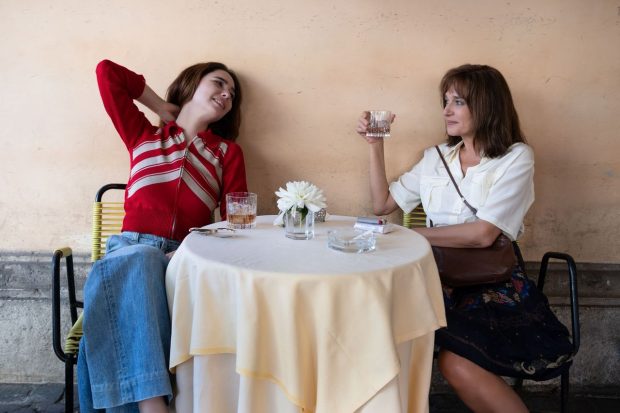The title, “Fuori,” carries powerful resonance—both as the Italian word for “out” and as a chant within the prison, shouted by the women after a charged incident. This evocative moment becomes a symbol of both collective longing for liberation and a reflection on what it truly means to be free, inside and outside the walls of Rebibbia.
Sapienza, played with superb authenticity by Golino, is caught in life’s unpredictable currents after a brief conviction for theft. Her relationships with Roberta (De Angelis), struggling with addiction and activism, and Barbara (Elodie), bloom into vital sources of emotional support and self-discovery. These friendships, carried into the heat of a transformative Roman summer, shape the creative and personal reawakening at the film’s core. Throughout, themes of solidarity, persistence, artistic struggle, and class boundaries are authentically explored.
The cinematography stands out with sepia hues, vibrant city scenes, and intimate prison interiors. While the movie is not rushed, each moment reveals layers of personal history and feminist solidarity. The story is slightly confronting and presents the trials and tribulations of women and artists.
Fuori succeeds by making Sapienza relatable. Her flaws, struggles, and flashes of humor, such as candid phone calls and awkward meetings, give her presence a natural warmth. The film captures the joy and pain of reconnecting with loved ones and the flashes of insight found in everyday moments, like a drunken taxi ride home.
The supporting cast, especially the women Sapienza meets in jail, offer memorable glimpses into lives marked by resilience and hope. Other details such as editing work for money, critical feedback on manuscripts, and the artistic drive amidst adversity show creative persistence.
“Fuori” has been both critically acclaimed and awarded, with particular praise for Golino’s performance. It is a raw reflection on liberation, justice, and the bonds formed in unexpected places, both a tribute to Sapienza’s legacy and a captivating piece of contemporary Italian cinema.
“Fuori” (“Outside” in English) is a moving and absorbing biographical drama directed by Mario Martone, with Valeria Golino, Matilda De Angelis, and Elodie, a cast of outstanding performers. The film is rooted in the real-life imprisonment of Italian feminist writer Goliarda Sapienza in Rome, 1980, inspired by her autobiography “L’università di Rebibbia”. A story unfolds xof bonds forged in prison and deepened outside, traced through shifting timelines and beautifully captured cityscapes.
The title, “Fuori,” carries powerful resonance—both as the Italian word for “out” and as a chant within the prison, shouted by the women after a charged incident. This evocative moment becomes a symbol of both collective longing for liberation and a reflection on what it truly means to be free, inside and outside the walls of Rebibbia.
Sapienza, played with superb authenticity by Golino, is caught in life’s unpredictable currents after a brief conviction for theft. Her relationships with Roberta (De Angelis), struggling with addiction and activism, and Barbara (Elodie), bloom into vital sources of emotional support and self-discovery. These friendships, carried into the heat of a transformative Roman summer, shape the creative and personal reawakening at the film’s core. Throughout, themes of solidarity, persistence, artistic struggle, and class boundaries are authentically explored.
The cinematography stands out with sepia hues, vibrant city scenes, and intimate prison interiors. While the movie is not rushed, each moment reveals layers of personal history and feminist solidarity. The story is slightly confronting and presents the trials and tribulations of women and artists.
Fuori succeeds by making Sapienza relatable. Her flaws, struggles, and flashes of humor, such as candid phone calls and awkward meetings, give her presence a natural warmth. The film captures the joy and pain of reconnecting with loved ones and the flashes of insight found in everyday moments, like a drunken taxi ride home.
The supporting cast, especially the women Sapienza meets in jail, offer memorable glimpses into lives marked by resilience and hope. Other details such as editing work for money, critical feedback on manuscripts, and the artistic drive amidst adversity show creative persistence.
“Fuori” has been both critically acclaimed and awarded, with particular praise for Golino’s performance. It is a raw reflection on liberation, justice, and the bonds formed in unexpected places, both a tribute to Sapienza’s legacy and a captivating piece of contemporary Italian cinema.






No Comments